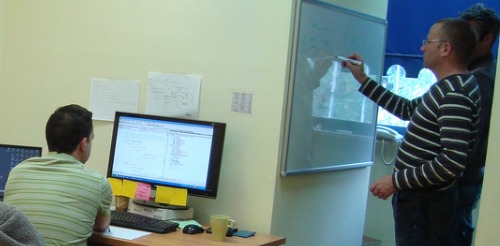Life sciences software house Comply is one of a small but growing number of Israeli businesses outsourcing work to Palestinian professionals.

Four Palestinian software engineers at Asal Technologies in the West Bank city of Ramallah are coding software as outsourcers for an Israeli life sciences software firm called Comply.
CEO Gai Anbar, 42, has worked with several outsourcing companies and currently employs three Israeli engineers to assist his Hod Hasharon-based business in providing life sciences quality and data management programs for pharmaceutical companies including Merck and Teva. When he decided three years ago to work only with domestic outsourcers, a colleague suggested contacting Asal.
“We were not looking specifically for this kind of arrangement,” Anbar tells ISRAEL21c. “We were just looking to outsource some of our programming. A friend told me about them and it was a business decision. I picked up the phone and that was that, just like calling anybody else.”
Business decisions of this nature have great significance in a country where Palestinian Arabs and Israeli Jews rarely cross paths, let alone work together. It is one example of an area where quiet but sure gains are being made.
A $10 million investment in training
In December, California-based Cisco Systems won the US Secretary of State’s Award for Corporate Excellence for its efforts to connect the Israeli and Palestinian economies and people. Three Ramallah-based Palestinian companies – including Asal – are benefiting from Cisco’s $10 million investment in training, equipment, and a direct communication link with Cisco Israel.
US Secretary of State Hillary Clinton used the occasion to launch the Palestinian Information Communications Technology Capacity Building Initiative (PITI) from Washington. PITI partners Cisco, Google, HP, Intel, Medcor and Salesforce.com will help strengthen the Palestinian private sector by promoting US investment and partnerships with Palestinian companies.
Comply models this sort of cooperation, and Anbar insists it simply makes good business sense. “Outsourcing really depends on the people — what is the message coming from their management, what is the atmosphere in the company,” he says. “At Asal, they were enthusiastic, very keen on succeeding and very ambitious. That’s what we were looking for.”
Comply began the relationship with a pilot project to assess the quality of the Asal engineers’ work and was pleased with the results. Anbar was seeking professionals who would not require any extra training to get the job done.
“I read their résumés. Basically, they studied either in local colleges in the West Bank, in training centers in Jordan, or in Europe or the United States. They each had at least three years of experience.”
If you work together, you don’t shoot at each other
Managers and employees at Comply were open to the idea of hiring Palestinian outsourcers, he said, though some adjustments were necessary.
“The same as with any other ‘offshore’ activity, you have cultural and language differences to overcome, and we had a learning curve on our side,” Anbar says. Comply and Asal workers communicate in English. “No matter where they are, outsourcers are not under your own roof and you can’t hover over them and tell them what to do. If they are Turkish or Indian or Palestinian, it’s the same issue.”
Amiram Shore, head of the Manufacturers Association of Israel’s Association of Electronics and Software Industries, is active in an initiative backed by the Swedish Foreign Affairs Ministry to build ties between Swedish, Israeli and Palestinian businesses.
“Our vision is that if they are working together they are not shooting at each other,” Shore tells ISRAEL21c. “They will be able to understand there is another way.”
In addition to fostering the Palestinian outsourcing industry, Shore is hoping at a later stage to assist them in developing new technologies. He reported that more than 10 Israeli and Palestinian companies have joint ventures in electronics, software and R&D.
Take care of your close neighbors first
“Both Israelis and Palestinians are ready to do business together,” he says. “This gives them opportunities to meet intelligent people who can influence society.”
Anbar does not actively promote the idea of outsourcing to Palestinian companies, but he freely discusses it with colleagues. “We’re not hiding it,” he says. “It’s a good business decision for a company looking to reduce costs.” Asal receives about $4,000 a month per engineer, less than Israeli outsourcers charge, but more than Indian or Chinese software engineers demand.
Anbar feels it is preferable to “take care of your closer neighbors” than to outsource to foreign countries even if it would be cheaper. The proximity also allows for a human touch. Top managers from each company go out to lunch together occasionally, and business relationships between the Palestinian engineers and Comply supervisors are cordial.
“We are very friendly, since we have been working together for more than three years now. This helps achieve normal life — this is what everybody would like to have, no matter your political agenda. We keep things professional, but I’m sure that people talking to one another, realizing the ‘other side’ is human, must have a positive effect.”













